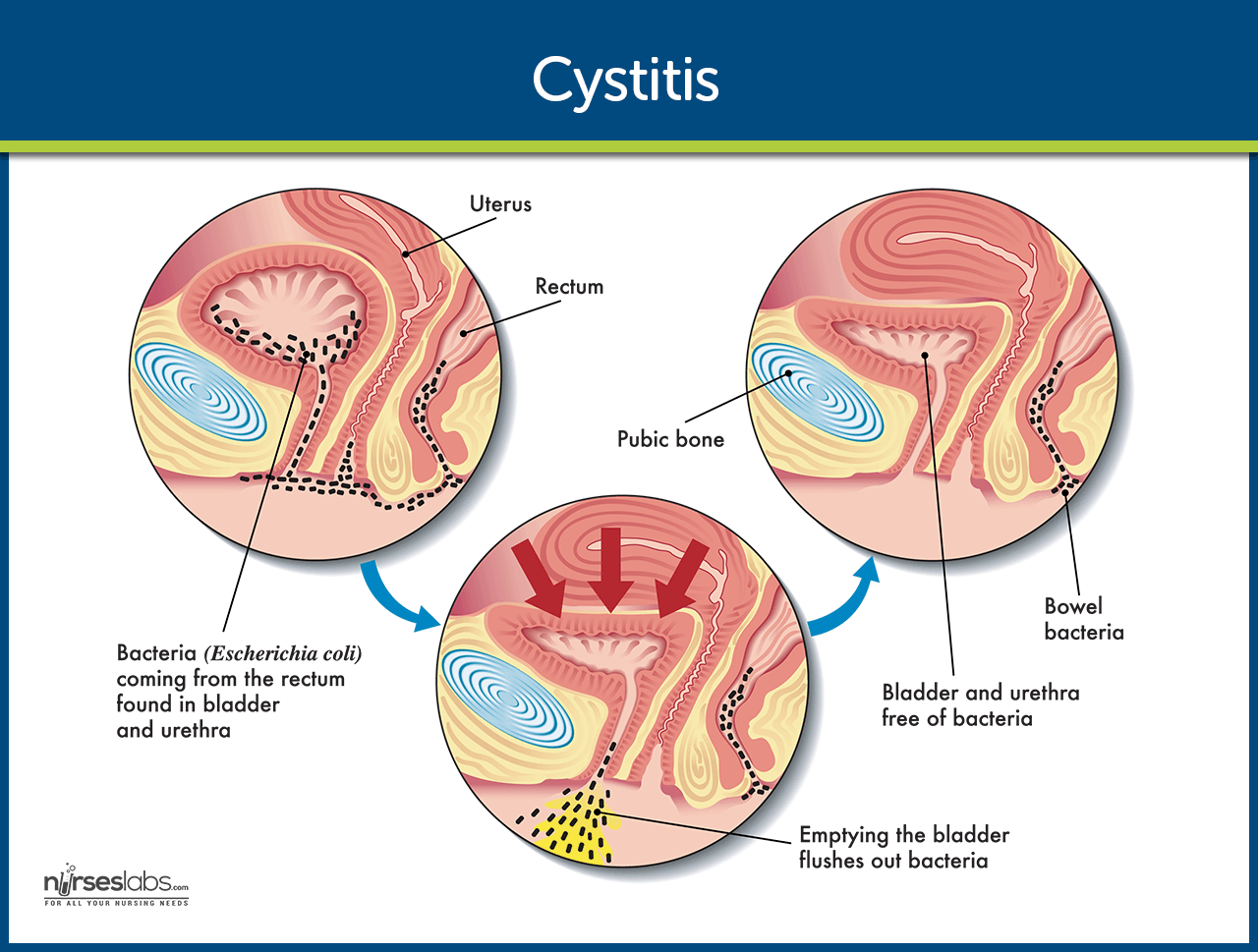Honeymoon Cystitis
Cystitis is a Urinary Tract Infection (UTI) that can last for a few days, with the most common symptoms including the constant urge to urinate and a burning sensation when peeing. However Honeymoon Cystitis is caused by sexual intercourse and almost only ever in women. This is for two reasons, firstly that a woman’s urethra is much shorter than a mans, and secondly because of the close proximity of the vaginal opening and anus to the urethral entrance.
There are numerous causes for Cystitis, including falling estrogen levels during menopause, using a birth control diaphragm, and even from changing tampons (if susceptible to UTIs, perhaps look at changing from tampons to menstrual cups).
Honeymoon Cystitis is typically caused when the bacteria E. Coli is spread to the urethral opening either from the anus or the vagina, from there it moves up into the bladder where the trouble starts. Despite originating from penetrative sex, Honeymoon Cystisis is not a STI. As such, and while safe sex is always recommended, condoms do not prevent Honeymoon Cystisis, and some studies even indicate a higher chance of getting a UTI with the use of condoms (perhaps try a non-latex condom if you have reactions to your current choice of protection).
Symptoms
Some of the typical symptoms of Honeymoon Cystitis are:
- A strong and persistent desire to pass urine
- A sensation of burning while passing urine
- Passing a small quantity of urine frequently
- Hematuria (presence of blood in your urine)
- Foamy urine, sometimes with a strong smell
- Low-grade fever
- Feeling discomfort in the pelvis or lower abdominal region
While the spread of the E. Coli bacteria is the cause of this UTI, there are two completely different ideas as to what makes someone more susceptible. Some say it is the first time of penetrative sex after a long spell of abstinence. The other end of the spectrum says that it can happen after intensive or frequent penetrative sex.
Prevention
However both sides of this agree on ways to prevent Honeymoon Cystitis:
- Urinate immediately after intercourse to ensure you eject any bacteria that could have entered the urethra
- Drink plenty of water every day
- Always wipe front to back to avoid bacterial spread
- Using a good water based lubricant, even if there are no issues with vaginal dryness, will help provide a good glide and prevent micro tears, especially around the vulva and vaginal opening.
Treatment
It is recommended to see your GP should you experience any of those above symptoms, as some of these also overlap with symptoms of a few Sexually Transmitted Infections that only a blood test will be able to reveal. If it is Honeymoon Cystitis, your GP will probably suggest the following:
- Prescribe a short course of antibiotics
- Maintain fluids
- Avoid alcohol
- Avoid more penetrative sex
- Cranberries (as in the actual fruit) may help with an active ingredient that prevents bacteria from sticking to the bladder wall. However, cranberry juice or capsules may not be potent enough for this to happen. In fact, despite popular belief, cranberry juice adds hippuric acid to urine, and Vitamin C in the form of ascorbic acid, and actually feeds the bacteria that cause UTIs.
On a final note, while you can indeed have penetrative sex while suffering Honeymoon Cystitis, as it isn’t an infection that can be passed on to the other partner, you will feel extra discomfort and even exacerbate the problem even further.
Other Sexual Issues Newlyweds Can Face
Performance Anxiety
Performance anxiety is a common issue for newlyweds. The pressure to meet expectations can create stress. This anxiety can negatively impact sexual performance. Newlyweds may worry about satisfying their partner. These concerns can lead to physical symptoms. Men might experience difficulty maintaining an erection. Women might find it hard to become aroused. To address this, open communication is crucial. Partners should discuss their worries and reassure each other. Practicing relaxation techniques can also help. Taking time to build intimacy slowly can alleviate pressure. Seeking professional help, such as therapy, can provide additional support. Performance anxiety is normal and manageable with the right approach.
Vaginal Dryness
Vaginal dryness is another issue newlyweds might face. Stress and hormonal changes often cause this condition. It can make intercourse uncomfortable or painful. Using lubricants can provide immediate relief. There are many types of lubricants available. Water-based lubricants are a popular choice. Partners should communicate openly about this issue. Women should not feel embarrassed to address it. Consulting a healthcare provider can offer further solutions. They might recommend hormonal treatments if needed. Staying hydrated and maintaining a healthy lifestyle can also help. Addressing vaginal dryness ensures a more comfortable and enjoyable sexual experience.

Erectile Dysfunction
Erectile dysfunction (ED) can occur in newlyweds. Performance pressure or fatigue often contribute to this issue. ED is the inability to maintain an erection. This can be frustrating and distressing for both partners. Open communication is essential to address ED. Partners should support each other without blame. Lifestyle changes can improve ED. Regular exercise and a balanced diet can help. Reducing alcohol and tobacco use is also beneficial. Professional help may be necessary in some cases. Medications or therapy can provide effective treatments. Addressing ED early prevents it from affecting the relationship.
Misaligned Sexual Desires
Misaligned sexual desires are common among newlyweds. Partners may have differing libidos, causing frustration. Open and honest communication is vital. Discussing sexual needs and preferences helps bridge the gap. Compromise and understanding are key. Couples should find a balance that satisfies both. Scheduling intimate time can be helpful. It ensures both partners feel valued and fulfilled. Exploring new activities together can reignite passion. Seeking guidance from a therapist can provide additional strategies. Misaligned sexual desires are normal and manageable with effort and communication.
Communication Barriers
Communication barriers can impact sexual satisfaction. Newlyweds might struggle to discuss their sexual preferences. This can lead to misunderstandings and frustration. Open communication is crucial for a healthy sexual relationship. Partners should create a safe space to share their thoughts. Active listening is important. It shows respect and understanding. Partners should express their desires and boundaries clearly. Using positive reinforcement can encourage open dialogue. If communication remains difficult, professional help can assist. Therapists can provide tools to improve communication. Addressing these barriers strengthens the relationship.
UTIs
Urinary tract infections (UTIs) are common among newlyweds. Increased sexual activity often leads to UTIs. Symptoms include a burning sensation and frequent urination. Drinking plenty of water can help flush out bacteria. Urinating before and after intercourse reduces the risk. Maintaining good hygiene is also important. Wearing loose-fitting clothing and cotton underwear can prevent UTIs. Over-the-counter medications can provide relief. If symptoms persist, consulting a healthcare provider is necessary. They might prescribe antibiotics to treat the infection. Preventing UTIs ensures a more enjoyable sexual experience.
Premature Ejaculation
Premature ejaculation (PE) is a concern for many newlyweds. Anxiety or excitement often causes early ejaculation. This can be distressing for both partners. Open communication is vital to address PE. Partners should reassure each other and avoid blame. Techniques such as the start-stop method can help. Practicing these techniques can improve control. Professional guidance might be necessary in some cases. Therapists can provide exercises to manage PE. Medications may also be an option. Addressing PE ensures a more satisfying sexual experience.
Did you know there are delay creams and sprays available? Use of these products slightly numb the glans of your penis. This enables those with premature ejaculation to last many times longer, satisfying their partners without worry of finishing early.

Painful Intercourse
Painful intercourse, or dyspareunia, can occur in newlyweds. Physical discomfort during sex can have many causes. It might result from vaginal dryness or other factors. Using lubricants can alleviate pain. Partners should communicate openly about any discomfort. Taking time for adequate foreplay can help. If pain persists, consulting a healthcare provider is crucial. They can identify underlying causes and recommend treatments. Physical therapy or medications might be necessary. Addressing painful intercourse ensures a more enjoyable experience for both partners.
Fatigue
Fatigue is a common issue after wedding activities. Newlyweds often feel exhausted from planning and celebrations. This can affect sexual desire and performance. Rest and recovery are important. Prioritizing sleep and relaxation helps restore energy. Partners should communicate about their needs. Scheduling intimate time can ensure both feel valued. Taking time to reconnect emotionally is also beneficial. If fatigue persists, consulting a healthcare provider is wise. They can rule out underlying health issues. Addressing fatigue ensures a healthier and more satisfying relationship.

Discover Nala’s enchanting tales! Since age ten, she’s been crafting stories for her pleasure. Now, she shares her fantasies with 11 published books!








Leave a Reply